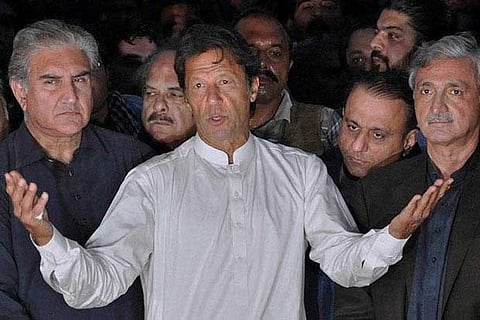

Islamabad
As Pakistani cricket star-turned-politician Imran Khan prepared for a victory rally to celebrate the success of his campaign to remove Prime Minister Nawaz Sharif from office, he said his aim was to take the job himself next year.
"We will contest the elections and I'm confident we will win the elections," Khan, 64, told Reuters late on Saturday.
He dismissed his own pending Supreme Court case investigating unreported assets as a political vendetta and vowed his future government would focus not on big infrastructure projects but on development for the poor.
On Friday, the Supreme Court disqualified Sharif from office on the grounds he did not report a nominal monthly salary from his son's Dubai-based company, money the prime minister says he never received.
Khan spearheaded demands for an investigation on Sharif after the leaking of the Panama Papers, which revealed his family had bought expensive London apartments through offshore companies.
In the end, the Panama Papers-related allegations were not the basis for Sharif's dismissal, but Khan's threat to paralyse the capital with street protests last year led to the court investigation into the premier's finances.
Analysts are divided, however, on whether Khan's recent win, combined with charisma and a populist pitch, is enough to defeat the political machine of Sharif's Pakistan Muslim League-Nawaz (PML-N) party in elections.
For all the furore over Sharif's ouster, the immediate balance of political power in Pakistani is unchanged.
The PML-N hold a healthy majority of 188 seats in the 342-member parliament, and it is expected to swiftly install an interim prime minister on Tuesday and later elect Sharif's younger brother, Shahbaz, as leader.
By contrast, Khan's party holds just 33 parliamentary seats.
"For time being, Imran has gained," political analyst Hasan Askari said. "He has an advantage, but we have to see whether he can sustain this advantage and convert it into votes."
Khan, however, clearly believes the stars are finally aligning for him, 21 years after he founded the Pakistan Tehreek-i-Insaf (PTI), which stands for Pakistan's Movement for Justice.
"We actually are moving towards a general democracy," he said, describing the Supreme Court's ouster of Sharif as a turning point for rule of law - though Sharif calls it as judicial over-reach and points out no corruption was proved.
On Sunday evening, thousands of PTI supporters streamed into Islamabad's Parade Ground waving flags and cheering as they waited for Khan to speak.
A product of elite schooling in Lahore and an Oxford University graduate, Khan captained his country to its only cricket World Cup victory in 1992. His fame and jet-setting lifestyle led to reputation as a playboy.
After his retirement, he initially focused on philanthropy, building a cancer hospital and working with various charities.
Despite Khan's name recognition, the PTI struggled for years to gain more than a few parliamentary seats until 2013, when it finished in third place behind the PML-N and the Pakistan People's Party (PPP) of assassinated former premier Benazir Bhutto.
The PTI did, however, win control of the local government of Khyber Pakhtunkhwa province, and Khan cited improvements in policing and education in the often-lawless northwestern area.
"Today in KP we have massive investment coming in ... more investment is coming in compared to past ten years in KP," he said, using the local abbreviation for Khyber Pakhtunkhwa.
Khan spoke to Reuters on a verandah at his palatial estate overlooking the Bani Gala hills on Islamabad's outskirts. The approximately 35-acre scenic property is the focus of the current Supreme Court case alleging Khan did not account for the source of the funds used to buy it.
Khan dismissed the case.
"I used to play cricket, everyone knows that. From that money, I bought this land. I've got all the papers," he said.
Improving Lives
Though Khan has long portrayed himself as the clean alternative to Pakistan's political establishment - deriding the family dynasties of the PPP and PML-N as "a form of monarchy" - his own elite upbringing and playboy reputation may not resonate with Pakistan's deeply conservative Muslim culture.
He was married for 9 years to British heiress Jemima Goldsmith, the daughter of a Jewish billionaire, and his two children spend most of their time in Britain. A second marriage to a Pakistani television presenter lasted only a few months.
Khan's relations with Pakistan's powerful military also raise questions.
When he paralaysed Islamabad with mass protests in 2014 demanding Sharif step down over unproven election-rigging claims, opponents suggested the army was encouraging him to weaken the civilian government - though Khan insists he is nobody's pawn.
His political policies lean toward populism, and he dismisses the achievements of Sharif's government, despite the fastest economic growth in a decade, progress in easing chronic power shortages and championing Chinese investment projected at $58 billion.
Big projects, Khan said, are not what is needed for the poor who make up the overwhelming majority of Pakistan's 190 million people.
"Their lives are not getting better," he said. "The lives of corrupt elite is getting better, the lives of the people are getting worse."
His future government, he says, would be different.
"We would spend more money on human beings, human development and strengthen state institutions," Khan said. "That's the most important thing."
Visit news.dtnext.in to explore our interactive epaper!
Download the DT Next app for more exciting features!
Click here for iOS
Click here for Android